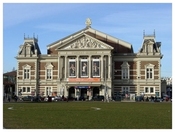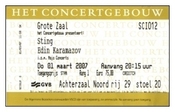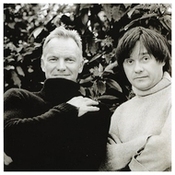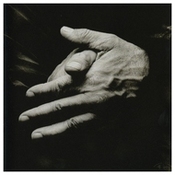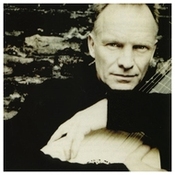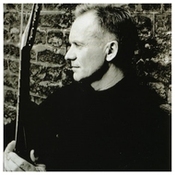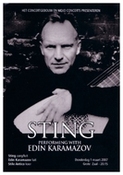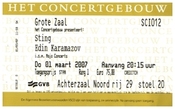
Songs From The Labyrinth
Boring Sting strums his old lute...
On the eve of the reunion tour with The Police, rock singer, guitarist, and activist Sting's performance last night was one of the most understated events in the 119-year history of the Amsterdam Concertgebouw. Persian carpets covered the stage in the sold-out venue, and there were six lutes with modest amplification. And Sting sang fragile songs by John Dowland (1563-1626), surrounded by silence.
"You're naked in that music," Sting said last year in an interview in this newspaper about the repertoire on his CD and DVD "The Journey & The Labyrinth," released last October by the classical music label Deutsche Grammophon.
Performed as a concert during a tour, it's a 90-minute crash course on John Dowland. Explanations of his life and work in Elizabethan England and the rest of Europe. Readings from letters. Singing his mostly melancholic songs.
Sting strums his lute, but leaves the virtuoso work to his mentor, Edin Karamazov. The London choir Stile Antico has precious little to do. It would fit in at the Utrecht Early Music Festival, but even there it's strangely understated, bordering on dullness. When Sting talks about the whims of Elizabeth I, you expect an illustrative surprise performance by Rowan Atkinson as Blackadder. And when he says England was a police state back then, a song by The Police.
The Early Music audience would be stunned by the opening: Bach's well-known Toccata and Fugue in D, played not on a mighty organ but on Karamazov's lute. Due to the lack of a program and lyrics, a few thousand people now think that music is by Dowland.
What Sting does isn't crossover, at most in terms of time. He seriously presents the real Dowland of four centuries ago. He's taken singing lessons, his husky timbre remains, his technique and expressive possibilities are limited. But thanks in part to his presence, the performances were perfectly acceptable, and they held the audience of 20 to 60-plus in utter silence. Sting operates here in the tradition of pop musicians seeking fragile silence. In the mid-sixties, Beatle George Harrison went to Indian sitar player Ravi Shankar, and screamer Janis Joplin gave a moving sang of the a cappella song "Oh Lord, Won't You Buy Me a Mercedes Benz."
The encores eventually had to change, such as Robert Johnson's "Hellhound on My Trail," with its fitting howl of hellhounds, and "Message in a Bottle" by, indeed, The Police.
(c) NRC Handelsblad by Kasper Jansen
Sting knows what to do with Dowland...
The dividing line between musical genres is, it seems, easy to pierce. John Dowland's songs were always considered Renaissance music, but as soon as a singer like Sting takes charge of them, they suddenly fall under the umbrella of 'world music'.
Not that Dowland, a contemporary of Shakespeare and a well-travelled musician himself, would have minded. He would have been quite surprised on Thursday, though, to hear the former Police leader perform his intimate songs at the Concertgebouw for an audience of two thousand: illuminated by coloured spotlights, microphoned through a wall-to-wall mixing console, and with a choir singing in soft-focus vocals in the background.
Over the course of an hour, the singer performed an excerpt from 'Songs from the Labyrinth,' his Dowland CD released last year on the classical music label DGG. Despite the electronics, the decibels weren't exactly booming: Sting primarily employed close-miking techniques, giving his light, husky voice a Marlene Dietrich-like sultriness, tempered here and there by contorted vowels and the spitting out of d's and t's.
Accompanist Edin Karamazov fared less well. The lute is simply an instrument that doesn't lend itself to amplification via microphone. The same thing happened to all the plucking and other finger sounds as to Sting's consonants. Especially Karamazov's arrangement of Bach's Toccata and Fugue in D minor, originally written for organ - already a superhuman feat for a lutenist - reduced to little more than clatter and rattle.
Sting's Dowland interpretations are more convincing. Everything about him reveals his deep affinity for the 16th-century pop musician, as he himself likes to portray him: from his attention to the languishing melancholy of the lyrics to the unruly two-against-three hemiols that give the chorus of "Can She Excuse My Wrongs" such a delightful swing. Moreover, he has delved deeply into the life of his great predecessor - his employment problems and his troubles with the then-English Secret Service. Just as on the CD, he enlivens his Dowland anthology with read-aloud excerpts from his letters, and even takes up the lute himself for an instrumental piece.
Such a program remains somewhat one-sided, so Dowland's appeal for "Come Heavy Sleep" threatened to take on a practical as well as a musical form. But then suddenly - Sting had barely been on stage for an hour - it was time for bouquets and encores.
"Fields of Gold" sent the audience wild for the first time, and blues legend Robert Johnson's "Hellhound on My Trail" had Sting and Karamazov howling at the top of their lungs.
But the Dowland-style "Message in a Bottle" made it clear what was wrong: is that called unplugged when not a single note is sung at the top of their lungs for an entire concert? It certainly sounded like Sting with the plug pulled.
(c) De Volkskrant by Frits van der Waa
Sting throws himself into John Dowland's work...
Only in one way was it clear that a pop star was on stage at Amsterdam's Concertgebouw on Thursday. Not in the musician's appearance: Sting wore a neat black blazer over his designer shirt. Not in the music, because most of it was over four centuries old. And not in the audience, because it exuded a distinctly "Old South" vibe. No, it was the "roadies," the musicians' stagehands, who, in baggy T-shirts and camouflage pants with flashlights in their back pockets, set up the instruments - lutes! - on stage. The former Police singer's performance didn't get any more rock 'n' roll than that.
When the solo careers of former members of major rock bands threaten to dry up artistically, there are usually two obvious escape routes: the group decides to reunion, or the musicians in question declare their desire to broaden their horizons and throw themselves into all sorts of "projects." Sting does both. His band, The Police, will soon reunite for the first time in over twenty years and will undoubtedly visit our country. Meanwhile, he also presents himself as an ambassador for the musical legacy of the sixteenth-century English lutenist, singer, and songwriter John Dowland.
The Policeman didn't make this decision overnight. For fifteen years, he has seriously immersed himself in the work of Dowland, who is often considered a kind of tormented singer-songwriter avant la lettre. Frustrated because, as a master lutenist, he wasn't chosen to be a musician at the English court, he travelled throughout Europe, leaving his songs behind everywhere.
Sting studied not only the songs but also their historical interpretations and enlisted the top lutenist Edin Karamazov from Sarajevo to record the songs with him. The result, the album "Songs From The Labyrinth," released last year, has been widely praised for the authenticity and unique character of Sting's singing voice, an "untrained tenor."
In the sold-out Amsterdam Concertgebouw, the singer demonstrates that the album is no fluke. Framed by excerpts read from letters by John Dowland, which serve to place the whole thing in a historical context, he sings the repertoire carefully and stylishly. Some songs are heavy-handed, but others, such as "The Lowest Trees Have Tops," are considerably lighter and even seem to have a pop element.
Yet, the atmosphere remains devout. Almost sacred. Relaxation only comes in the encore, when he sings - also with lute accompaniment! - his own hits "Fields Of Gold" and "Message In A Bottle," plus a blues classic by Robert Johnson. Then you suddenly realize the similarities, but especially the differences, between European Renaissance songs and rock songs rooted in the African-American tradition. Sting will undoubtedly bring some extra attention to John Dowland's music, but this project will ultimately prove to be nothing more than a curiosity.
(c) De Gelderlander by Peter Bruyn

